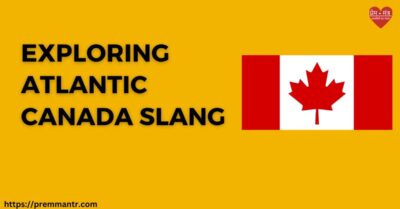Atlantic Canada is known for its breathtaking landscapes, vibrant culture, and warm-hearted people. But did you know that the region is also rich in unique slang and colloquial expressions that add an extra layer of charm to its identity? In this article, we will delve into the fascinating world of Atlantic Canada slang, exploring its origins, popular phrases, and the endearing linguistic treasure that it represents.
Understanding Atlantic Canada Slang
The Atlantic Canada region, comprising Newfoundland and Labrador, Prince Edward Island, Nova Scotia, and New Brunswick, has a distinct linguistic heritage. The slang spoken here has been shaped by the region’s rich history and diverse cultural influences. From the Gaelic and Scottish settlers in Cape Breton to the Irish and Engl ish immigrants who arrived in Newfoundland, each group left its mark on the local language.
Read – Very Popular Canadian Slangs, You must know !
2. Expressions and Vocabulary:
a) “B’y” and “Luh”: These terms are widely used in Newfoundland and Labrador. “B’y” is derived from “boy” and is used to refer to a person, often a friend or acquaintance. “Luh” is an abbreviation of “love” and is used as a term of endearment.
b) “Giv’r”: A popular phrase in Atlantic Canada, particularly in Nova Scotia, it means to give your all or put in maximum effort. It reflects the region’s hardworking and determined spirit.
c) “Turr’ble”: This word, derived from “terrible,” is a classic example of Atlantic Canada slang. It is used to describe something as extremely bad, but with a touch of humor and exaggeration.
d) “Sook”: Used in Prince Edward Island, this term refers to someone who is overly sensitive or easily offended. It reflects the Island’s close-knit community and the expectation of resilience.
3. Quirky Expressions:
a) “Stay where you’re to ’til I comes where you’re at”: This phrase, commonly heard in Newfoundland and Labrador, means “Stay where you are until I come to you.” It showcases the distinct phrasing and syntax found in Atlantic Canada slang.
b) “Stay where the pepper grows”: This humorous phrase from Prince Edward Island is a playful way of telling someone to stay out of trouble or mind their own business.
Preserving Atlantic Canada Slang
Atlantic Canada slang is more than just a collection of words and phrases; it is a cultural legacy that connects communities and reflects their shared history. However, in an increasingly globalized world, local dialects face the risk of fading away. Here are some ways to preserve and celebrate Atlantic Canada slang:
- Oral Tradition: Encourage conversations between generations, where elders can share their knowledge of regional slang with younger members of the community.
- Storytelling and Literature: Encourage writers, poets, and authors from the region to incorporate local slang into their works, ensuring that it remains a part of the literary landscape.
- Festivals and Events: Organize events and festivals that celebrate Atlantic Canada culture, where the use of local slang can be promoted and appreciated.
Conclusion
Atlantic Canada slang is a linguistic treasure that reflects the region’s unique history, culture, and sense of humor.
From Newfoundland and Labrador’s “b’y” to Prince Edward Island’s quirky expressions, these words and phrases add a special charm to the language spoken in this part of Canada. Preserving and celebrating Atlantic Canada slang ensures that this rich linguistic heritage continues to thrive and be cherished for generations to come.
So, the next time you visit the beautiful Atlantic provinces, embrace the local slang, and immerse yourself in the colorful tapestry of words that define this captivating region.
- Formula 1 General Admission Tickets: Guide to Canada Grand Prix
- The Ultimate Guide to Circuit Gilles Villeneuve General Admission
- Exploring the Unique Delights – Weird Canadian Foods
- Discover the Exquisite Flavors of Uncommon Canadian Foods
- Quintessential Things Canadians Do at Parties: Embracing Fun
